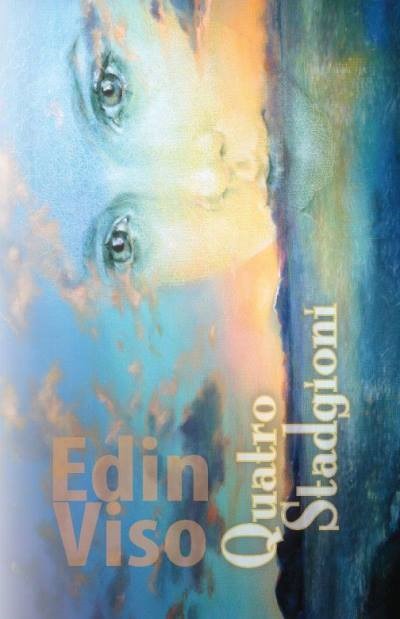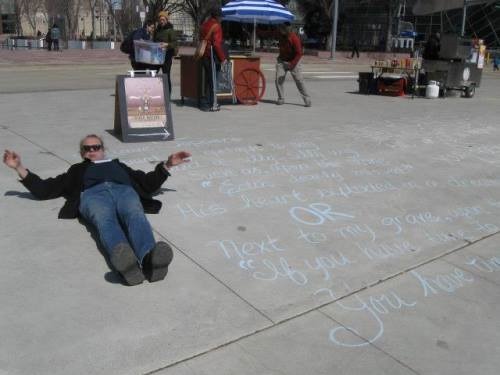If you’ve never heard Edin Viso read his poetry, you owe it to yourself to head down to Ground Zero Monday, May 27, and hear the ‘Madman’ himself. He’ll be reading from Balkan Tattoo and from his new book Quatro Stadgioni (cover art by the amazing Oksana Zhelisko). I was privileged to write a foreword for this book.
Long echoed down writerly halls is the oft heard but sporadically heeded advice, don’t hold anything back.  Here, in Edin Viso’s second book of prose and poetry, there is no hesitation. The qualities of his mind and the experiences of his heart are laid bare. This is spiritual writing writ large, birthed by love and discipline; midwifed by, as Edin says, “an addiction to writing.”
Here, in Edin Viso’s second book of prose and poetry, there is no hesitation. The qualities of his mind and the experiences of his heart are laid bare. This is spiritual writing writ large, birthed by love and discipline; midwifed by, as Edin says, “an addiction to writing.”
It may be helpful to note here that Edin’s prose style is distinctively conversational. Reading his prose is not unlike finding yourself at a table in the back room of a Beat coffee house, drinking strong black Java while listening to a friend spill out in one great sweep, ideas, memories and convictions.
Taking the work as a whole, a reader will soon see that what we have here is an ebullient Balkan poet, who—having witnessed and absorbed the ravages of his country’s demolition, having experienced, even as he fled, his own dismantling, and then his “restoration of peace”—puts it all down with blunt intensity. And it will come clear throughout that Edin’s faith plays a central role, while Hope Mission, to which the book is dedicated, plays a leading character.
Edin Viso has divided his literary house into four rooms. We are lead, sometimes straight, sometimes roundabout, through this quatrain-space, where, especially in the poetry, the quotidian meets the majestic, the visceral meets the visionary, high-flung humour meets the holy.
 In the Show Room we are plunged into experiences of a dark and bitter past that admit finally to possibility. Images coil like entrails, then like green vines, as we are shown bleak flashbacks and hopeful lobs into the future. In these self-effacing and self-reflective pieces we may find ourselves torn and exposed. And yet, as in the poem Whales Turning, there are winds that blow for a better world; and “The poet wonders / What kept him?” Never far from any dark page is the mystic/romantic, incurably hopeful in the power of love.
In the Show Room we are plunged into experiences of a dark and bitter past that admit finally to possibility. Images coil like entrails, then like green vines, as we are shown bleak flashbacks and hopeful lobs into the future. In these self-effacing and self-reflective pieces we may find ourselves torn and exposed. And yet, as in the poem Whales Turning, there are winds that blow for a better world; and “The poet wonders / What kept him?” Never far from any dark page is the mystic/romantic, incurably hopeful in the power of love.
Through the Tropic Room and Desert Room, there is progression; but it is the progression of life, never absolute—resembling a corkscrew rather than a ruler. There are poems that gaze: ask you to “Put up your face and catch the scented rain;” then there are those that grab your lapels and bring you up sharp, for the “eggshells of air are full of our very own danger.” There’s a minefield of surprising images here.
Finally, in the Cool Room, we find an extended riff on God, love, Christ, a kind of stream-of-consciousness-testimony that culminates in a tentative arrival: the recognition that God’s promised land is found nowhere other than within.
This is a big-handed, big-hearted book. In these pages a rough god goes riding. In the flow of experience subjectively described we find ourselves in the presence of a man, who having followed hard after desire (“Sense in me the crush of yearning.”) has been opened to beauty and grace and love. Unmistakably, this writing is Edin’s way of sharing what he’s found.
And as for writerly advice, this author has garnered his own: plucked from the Pentateuch where God tells Moses to remove his sandals, which Edin sees as “the most important commandment in the Hebrew Bible,” he notes, “When you are left barefoot on Holy Ground, write that!”
Virginia Woolf has said that, “Every secret of a writer’s soul is written large in his works.” In Quattro Stadgioni Edin Viso’s soul-secrets are burned onto the page. Revealed like this they become “An endless dance of small fires around the bone.”
